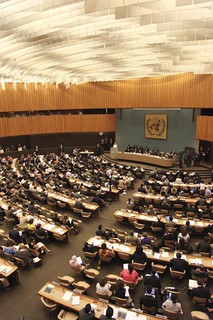 |
| ECOSOC, from unisgeneva's photostream on Flickr |
Those who work in the development field currently find themselves in tricky debates around the future of the MDGs, the new Sustainable Development Goals (SDGs) and the Post-2015 framework as a whole. Having to deal with numerous disjointed and confusing processes, hundreds of meetings, and an astounding amount of information, it has been hard to dedicate enough time for proper reflection, analysis and planning.
Fortunately, the STEPS Centre Symposium helped to shed light on the role of science in this important moment for the future of development.
In the session Beyond Rio+20: improving global structures for scientific advice, Lidia Brito brought one clear message: instead of focusing only on final outcomes, it is necessary to give more value to influencing processes – in her own words, 'it is all about keeping the conversation going'. For the scientific community, the Rio+20 conference was far from a failure as it gave science an important space in the agenda. Now, the goal is to keep improving the spaces and mechanisms for scientific advice to policy-makers, seizing opportunities such as the UN Economic and Social Council (ECOSOC)'s focus on the role of science, technology and innovation in 2013, the new UN Science Advisory Board, and Future Earth.
Robert Watson added to this by stressing the importance of reconsidering the way science is communicated: to magnify impact in public policies, it is necessary to make clearer connections to issues that a broader audience can relate to, such as food, energy and water. Furthermore, Watson mentioned the need for a multi-disciplinary approach to science, and the urgency for closer interactions with local traditions and indigenous knowledge.In a second session related to the Post-2015, From MDGs to SDGs: aspirations, evidence and diversity in setting global goals, the panelists expanded the debate.
Camilla Toulmin highlighted several crucial factors that have been weakly addressed by the MDGs and must receive much higher attention in the Post-2015 framework: universality, inequality, accountability, integration between goals, mechanisms for implementation at national and local level, and long-term political leadership.
Duncan Green looked at things from a different perspective, and posed an important question: by focusing so much on analyses and consultations to try to find out which should be the next development goals, aren't we leaving aside a deeper reflection about the implementation side? Apart from countries highly dependent on aid, the MDGs didn't bring a notable impact on national and local policy-making – shouldn't we dedicate more attention to finding out how to change that?
Finally, Chris Whitty brought attention to the fact that the scientific community needs to look for three different types of evidence to influence the Post-2015 processes in a consistent way:
- evidence of need, to identify the real needs of the present and future generations;
- evidence of reasons for why the things are the way they are;
- and evidence of impact, that shows how change really happens on the field.
Although we all still have much more questions than answers, the STEPS Symposium surely helped clarifying the current state of the Post-2015 debates and the role science can play in the ongoing processes. The call for action is strong, and several spaces for engagement already exist.
Coming from Brazil, I would like to add two more questions to the list. It is clear to me that the scientific communities of many developing countries are much more distant from influencing development policy than those of the North. How can we use Post-2015 to change that? And which types of partnerships between institutions and individuals from the North and South can help in the process?
It looks like we have got a lot of work to do!
To view resources, video, commentary and slides from the event, visit the Symposium page on the STEPS Centre website.
This article was originally posted on the The Crossing.
